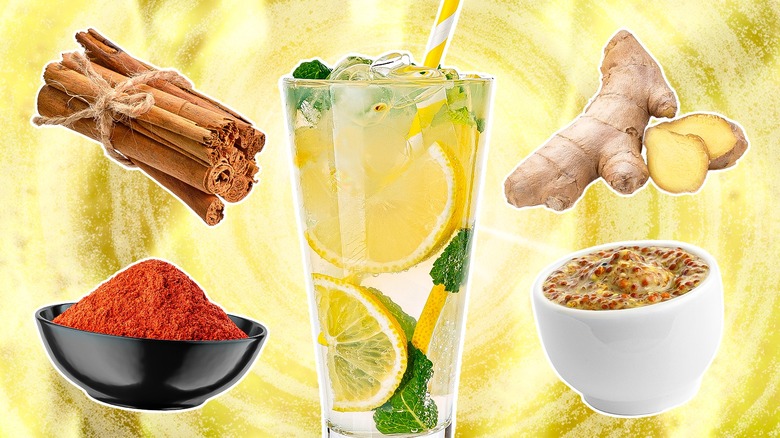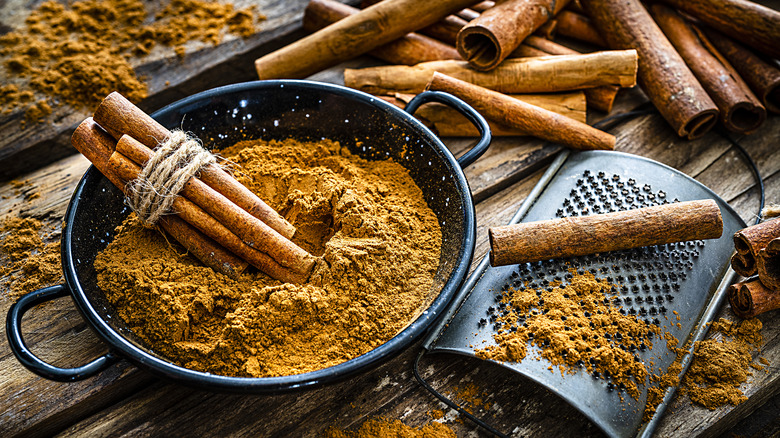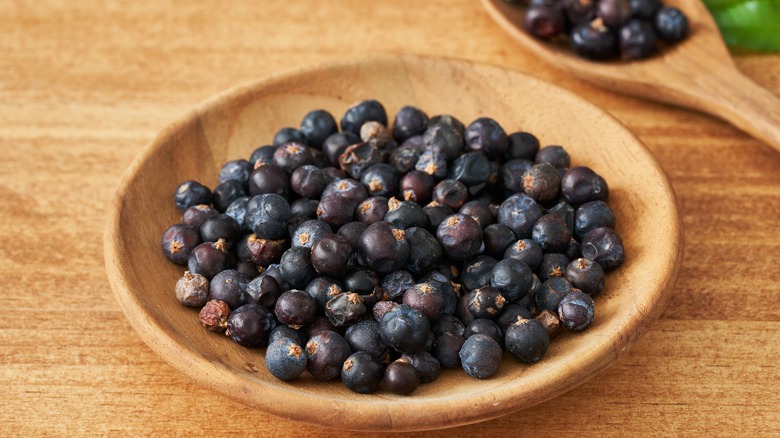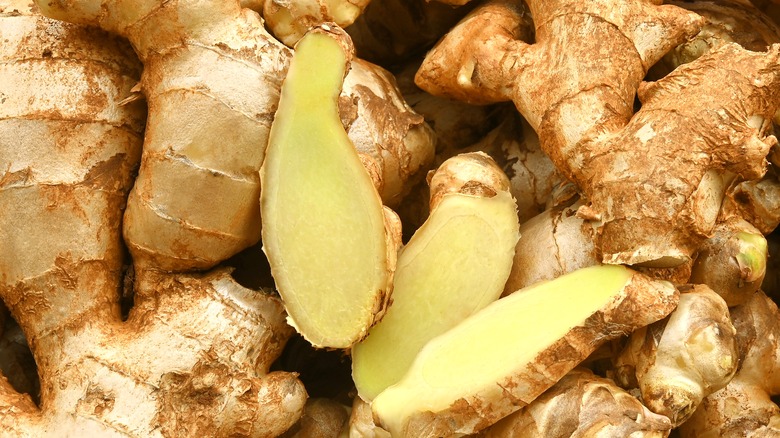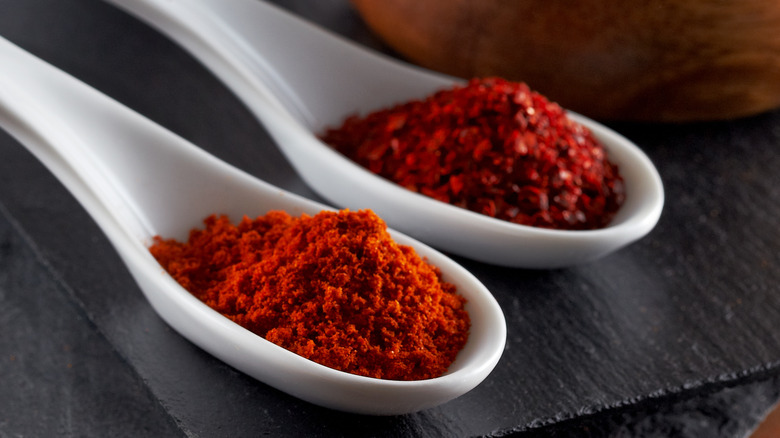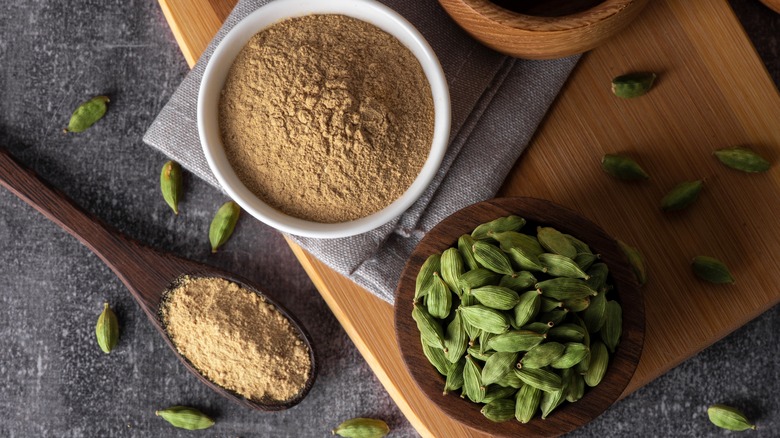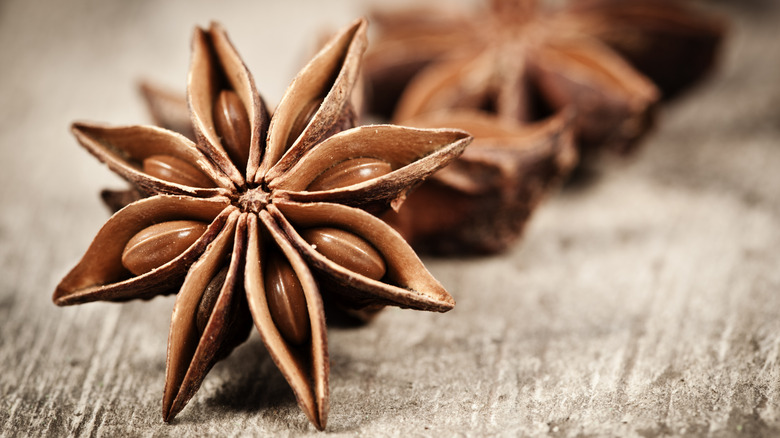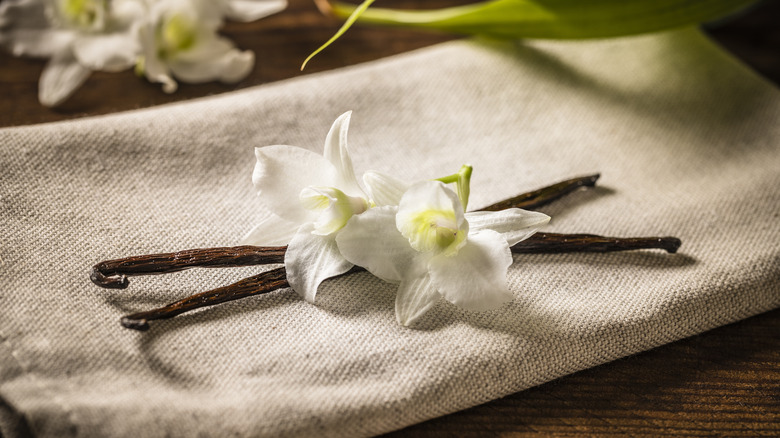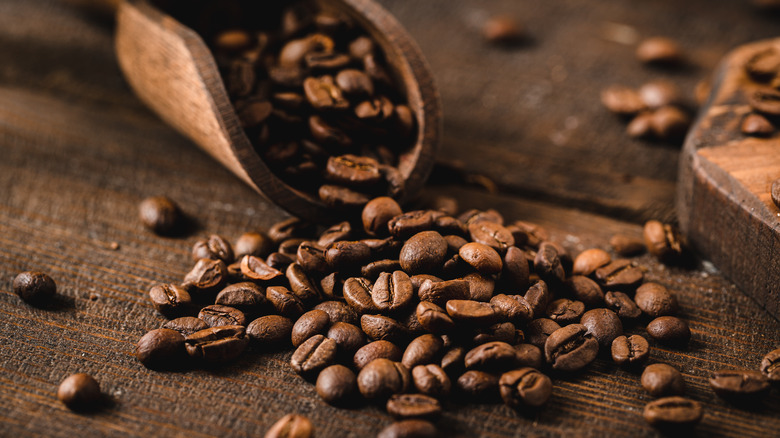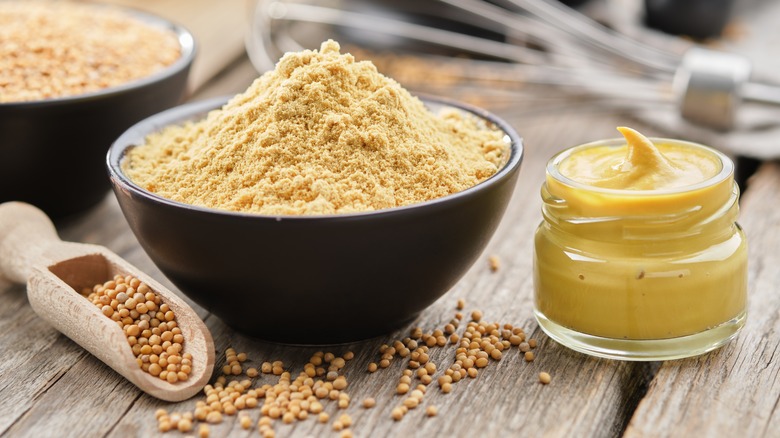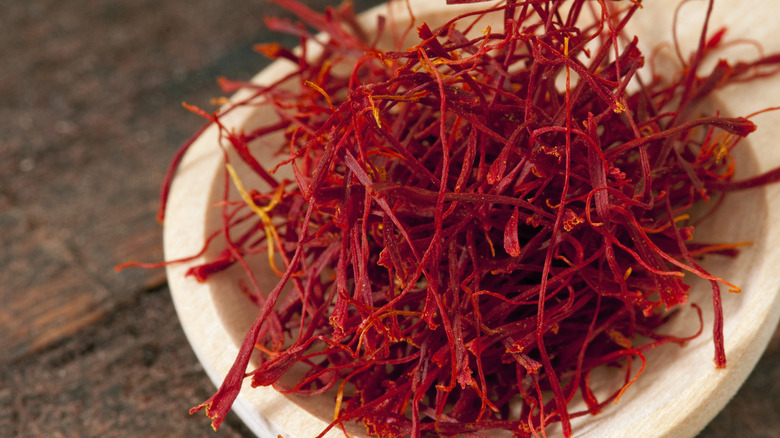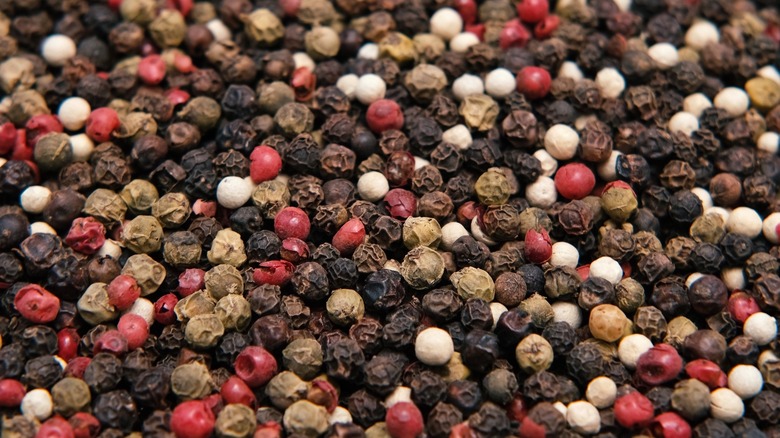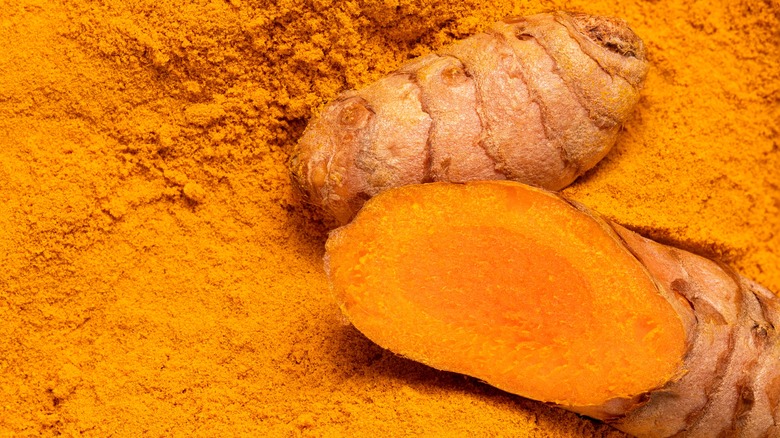13 Spices That Will Elevate Your Lemonade
Lemonade is a popular drink beloved by many. It's a mix of lemon juice, sugar, and water, but if there's ever a time when you want to switch up how you make it, there are a few interesting spices that will elevate lemonade. It doesn't matter if you prefer to make your lemonade from scratch, or if you buy jugs of it from the store, these spices can provide it with additional aromatics, flavor, and depth. It can make all the difference when you're trying to give your drink a bit of pizzazz. Some of these are popular spices that are often paired with lemon, whereas others might have you rereading with doubt.
We'll cover the spice, why it works, any additions you could include, and other details to help make your lemonade the best it's ever been. Revamp the way you think about serving this tart beverage. You might have a tried and true family way of making lemonade, but for the sake of clarity, we will follow the classic lemonade recipe that involves making a simple syrup. However, you can apply any recipe to these spices or use store-bought lemonade. We'll share any other best practices or things to consider, but no matter which spice you try, it will entice your senses. From surprising ingredients, such as mustard to sumac, to popular spices, such as cinnamon or ginger, your lemonade is about to get an upgrade.
1. Cinnamon
Cinnamon is a regular addition to many baked goods and beverages. As far as beverages go, you'll often see this spice in teas, mixed with milk for a hot cinnamon milk steamer, included in hot toddies, and more. Adding cinnamon to your lemonade is no surprise, especially when you consider that it was a sweet accident that may have led to the creation of pink lemonade in the first place.
Cinnamon complements the lemon and sugar to create a delicious combination. You can be heavy-handed with the cinnamon or simply do a light sprinkle. Make your simple syrup and add the cinnamon into the mixture as it simmers, allowing it to truly infuse into the sugary water. This allows for a better infusion than if you were to add cinnamon to the finished product, where the cinnamon might stick to the sides of the glass and never quite fully incorporate. Use ground cinnamon or cinnamon sticks. Ground cinnamon will provide more visual flecks of cinnamon, whereas the cinnamon sticks won't be as obvious, but you'll have the flavor. You could keep the sticks in the lemon jug for aesthetics, as well.
2. Juniper berries
You'll often find juniper berries in gin and other botanical beverages, but you might want to put them in your lemonade. Juniper berries are the only conifer that's regarded as a spice; they are piney, peppery, spicy, and citrusy with a strong pine-like aroma that can pair beautifully with the sweetness of a lemonade. Crush the juniper berries in a mortar and pestle, so you can unlock the flavor easier. Incorporate the berries as you boil the sugar and water to make the simple syrup, let it steep, and then strain them from the syrup.
If you want to pair it with something, it can go nicely with the floral components of lavender or the freshness from mint. Turn it into an adult beverage with the botanical elements of gin, as it's amongst the best drinks to mix lemonade with. These combinations make a spellbinding lemonade that will impress those with adventurous taste buds, given that not everyone enjoys the flavor notes of pine. Juniper berries can be overwhelming if used in excess so you can introduce a small amount until you can establish what potency you like. This is a refreshing drink you'll want to have on hand to cool off by the pool.
3. Ginger
Ginger root is a popular spice that you'll see in plenty of drinks, baked goods, and meals across the world. Many ginger root wellness shots combine lemon and ginger, so a ginger lemonade simply integrates sugar into the mix. Ginger is not only tasty and invigorating, but it has some health benefits to boot. Ginger has anti-inflammatory compounds, can provide nausea relief, and relieve bloating and gas.
Get the slightly spicy kick of ginger by using either powdered or fresh ginger. Peel fresh ginger and place it in your sugar mixture while making the simple syrup. Pour a touch of honey into the simple syrup to bring out the sweetness. Try orange blossom honey or wildflower honey for a light floral flavor. Chop them into larger chunks and then strain out the pieces, or if you enjoy the pulp that is similar to the pulp in the lemon juice, grate the ginger and leave it in your lemonade. Dried ginger powder, although not as strong as fresh, is also a fantastic and convenient option. Instead of sugar, use honey to complement the lemon and ginger or mix in freshly squeezed lime to double up on the citrus component. Add some fresh mint for a hint of green and a refreshing taste.
4. Cayenne
For those who relish a good spicy beverage, a piquant lemonade with cayenne might just do the trick. Sprinkle in the cayenne pepper powder to your simple syrup to allow it to fully steep into the sugared water. This will also keep the cayenne from clumping together in random areas of your lemonade or piling up on the surface if you were to just add it directly to your lemonade. When you want it to be lightly spicy, do a shake or two of cayenne, and for a spicier version give it a few extra shakes or pair it with freshly chopped jalapeño.
You could choose to mix the cayenne with the lemon juice on the side, then add it to the sugar mixture – cayenne lemonade is spicy and delicious. Rather than white sugar, you could choose to use brown sugar, honey, or maple syrup to switch up the sweetness in a nuanced way. Cayenne pepper makes a red addition to the lemonade, but it's not to be confused with paprika. They have completely different flavor profiles, with cayenne offering more heat than paprika. Add tequila and a dash of hot sauce for an alcoholic lemonade.
5. Cardamom
You can find cardamom used in both sweet and savory dishes from various cultures. The taste of cardamom can be both sweet and savory since it can taste spicy, sweet, or peppery, making it a versatile addition to lemonade. But this is not a subtle spice; it is powerful, robust, and makes itself known. Pop in a couple of cardamom pods into your simple syrup to infuse with the delightful cardamom flavor, grind it up in a mortar and pestle, or use cardamom powder. All of these are effective ways to integrate this spice.
Cardamom can be a bit fibrous. Straining the powder can help with the consistency, so you're not left with any of the woody bids. Use white sugar, brown sugar, or coconut sugar to create the simple syrup for a cardamom lemonade. Have fun with inclusions, such as mint or sweet basil, or opt for lavender or rose as floral additions. While it can be on the more expensive side as far as spices go, the great thing about cardamom is that a little goes a long way. You only need a couple of pods or a pinch of cardamom for a large batch of lemonade.
6. Sumac
While it's often used in savory dishes like homemade za'atar, sumac might not be on your radar for sweets. This vibrant spice can be integrated to give shortbread cookies a tart bite or sprinkled into your lemonade. Much like lemon, sumac offers a tanginess that can lift desserts and drinks too. Make a bewitching hibiscus sumac syrup that is not only visually spellbinding, but tastes like something you haven't had before. It's floral from the hibiscus and leans into the tartness of both the sumac, lemon, and hibiscus, while the sugar rounds everything out for an unforeseen combination.
Both the hibiscus and sumac offer a reddish color to give lemonade a color upgrade. Sumac is one of those unique spices that will elevate your lemonade into something you might expect at a fancy rooftop hotel bar. Use sumac berries if you happen to have them, but sumac powder is just as effective, if not easier to work with. This complex drink is delightfully refreshing and thirst-quenching when you want to reach for something other than your standard lemonade. Sumac on its own is a bit tart, so pairing it with lemons doubles the zest to create a sour duo.
7. Star anise
Star anise has a licorice taste with a light sweetness to it. If you chew on the pod itself, the distinctive flavors come forward. If you're not a fan of licorice, it's not as straightforward as the licorice plant itself. It's surprisingly complex and this could be a great starting point if you're not the biggest fan of the aromatic root. Star anise, not to be confused with anise seed, is a bit more bitter and comes in its classic star shape. As you're making the simple syrup, chuck the pod into it or break off a couple of pieces. While star anise tends to be more licorice-forward compared to anise seed, the bitterness of the star anise works in harmony with the notes from the lemon, while the sugar sweetens it all up.
Star anise lemonade is captivating, unexpected, and a fantastic spice for lemonade for those who find allure in uncommon pairings. Use white sugar or maple syrup for this intense lemonade. As you're making the simple syrup for the lemonade, place your star anise in the mixture. Allow the spices to infuse and then simply pick them out when it's ready to combine with the lemon juice. For those who adore licorice, sprinkle in some licorice root along with the star anise during the infusion process. Garnish the glasses with the leftover star anise.
8. Vanilla
Oh, vanilla, you beautiful versatile spice. Did you know that vanilla is part of the orchid family? You'll find vanilla and many lemon-based baked goods and sweets, such as cupcakes, cookies, and loaf cakes, but you should make vanilla lemonade part of your summer sipping staples. Although it's more expensive than imitation vanilla extract, for a robust vanilla lemonade, use vanilla beans, pure vanilla extract, or vanilla bean paste. Artificial vanilla flavoring can most certainly be used, but it's not as smooth or aromatic.
Vanilla bean paste or fresh vanilla pods will offer beautiful little specks that can give dimension to your lemonade in addition to the taste. However, standard vanilla extract does the trick. After making the simple syrup and allowing it to cool, add your vanilla of choice and lemon juice, then mix. You could also add it directly into store-bought lemonade. For a captivating combination, use lavender with vanilla to make a complex, floral lemonade, or place a few jasmine flowers in the simple syrup for a vanilla jasmine simple syrup. You might also feel inclined to add other fruits, spices, or herbs to the mix since vanilla makes a wonderful foundation. Fresh spearmint can provide a refreshing component while raspberry vanilla lemonade has a fruity lightness with a beautiful color, especially if you muddle or mash it and then strain the berries.
9. Coffee beans
While an Arnold Palmer is lemonade with tea, coffee lemonade isn't exactly named after anyone in particular. Coffee isn't universally regarded as a spice, but is often used as one like coffee spice rubs for steaks or to add richness to cakes. In this case, coffee can provide a fragrant, earthy addition to your lemonade. Depending on the coffee and brands, it can also have unique flavor profiles with fruity, nutty, floral, or bitter notes. In addition to the natural flavors in the coffee, there are also flavored coffees as well as varying roasting levels that can provide nuance to these beans.
For this particular tip, you don't necessarily want to add coffee beans or ground coffee to the lemonade, it's best to use brewed coffee or cold brew to pour into the drink. Coffee lemonade, although not a prominent combination, is still a known duo that you might occasionally find on menus. The bitterness of the coffee and lemons conspire together in the best way possible. Don't knock it until you try it. You can make it more lemon-forward or coffee-forward depending on your taste preference, it doesn't have to be 50-50.
10. Mustard
Mustard seeds are a well-known spice that you'll find in many savory dishes across the globe, but they might be a shocking ingredient for desserts and sweets. We're not talking about squirting a bunch of bright yellow mustard into dessert, we're talking about the spicy subtlety of Dijon mustard or whole grain mustard. This type of mustard provides a similar but not exact profile as cayenne since it's sharp and spicy. There are mustard spice cookies,mustard carrot cake, and other mustard desserts that delightfully blend sweet with savory to create a refined flavor.
Dijon mustard is the unexpected ingredient to spice up your lemonade. This type of mustard is spicier and less vinegary than the typical yellow mustard, which allows you to stray far from a traditional lemonade. This spiced lemonade can offer a surprising addition since not many people would expect a condiment in their lemonade. It doesn't have to be much, a simple teaspoon can do the trick, but you could put more if you want. This combination might not suit everyone's tastes, but it could be an interesting option when you have a hankering to try something that you're not likely to find on many menus. It'd be fun to see if anyone could guess the secret ingredient if you make it for a gathering.
11. Saffron
Make an earthy but subtle lemonade with saffron. It's not going to take over a dish or drink, but it's enough that you can taste that it's there. Mixed with the lemon and the sugar it combines into a complex option that provides an almost grassy sweetness. Saffron is the world's most expensive spice since each individual stigma needs to be harvested; it's quite a laborious process that can only be done at certain times of the year, which contributes to its hefty price tag. Make saffron lemonade by grinding the saffron in a mortar and pestle, so it's powdered. You could leave the stigmas as they are if you want to have the visual component, but crushing them into a powder might be a good choice for those who are new to saffron or don't necessarily want to have a saffron thread in their mouth as they take a sip.
Add the powder to the simple syrup once your sugar is mostly dissolved. This allows it to fully infuse without exposing it to extreme heat during the boiling process. Since saffron is an expensive spice, it might be the most luxurious lemonade without even knowing it. You don't have to add a lot, a pinch can do the trick since it can provide a light change in hue while also contributing to its light earthiness.
12. Peppercorn
Rainbow peppercorns from the store make a provocative option to mix into your lemonade. It can provide a delicate spiciness to the drink if you're in the mood to experiment. Opt for rainbow peppercorns, pink peppercorns, or other types of peppercorns. Crack the fresh peppercorn into the simple syrup to infuse. You don't have to add too much, a couple of cracks will suffice. Pink peppercorns are a perfect match if you want to make pink peppercorn lemonade with something like strawberries, grenadine, or even a hint of beet juice. The pink element can range from anything like cranberry juice to watermelon so it's a deeply customizable option.
Crack the pink peppercorn or your peppercorn of choice into the simple syrup and then strain. Garnish each glass with two or three peppercorns to round out your beverage. It's chic and sophisticated with an interesting twist that you could also pair with fresh herbs, such as rosemary, basil, or mint. When using cracked or ground peppercorns, you'll want to strain it from your simple syrup sense. It doesn't dissolve into the simple syrup, and you probably don't want crunchy pieces of pepper as you're sipping your beverage.
13. Turmeric
Turmeric is another spice to often see paired with lemon drinks or wellness shots, so it can easily be incorporated to create a rejuvenating lemonade. It offers a stunning shade of yellow that can work in conjunction with the yellow of the lemons to combine into an orange-yellow. Add a pinch of the turmeric to store-bought lemonade or simple syrup. It has an earthy flavor that while noticeable doesn't engulf the entire flavor profile. The earthiness creates symmetry with the tartness of the lemon and the sweetness of the sugar for a tantalizing trifecta.
You can use turmeric powder for simplicity, but fresh turmeric is a welcome choice. When using fresh turmeric, peel and chop it finely to add to the simple syrup. Drizzle in honey for a delicate sweetness, but you could also choose to use Meyer lemons, which are sweeter side compared to the standard lemon. This choice works beautifully with the earthiness of turmeric. If you want a fruit element, fresh blueberries combine nicely with the lemon tart while also giving an incredible color.
